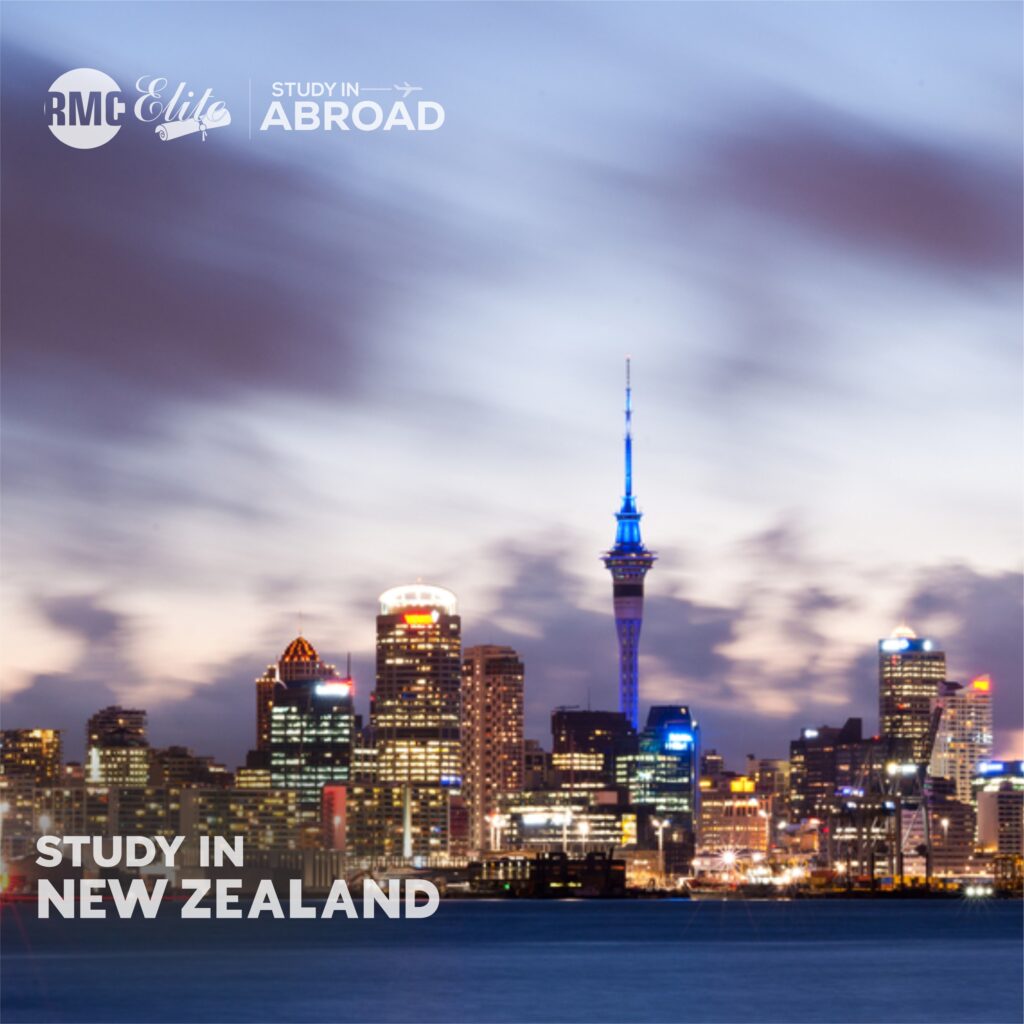
About New Zealand
New Zealand is a popular destination for international students seeking high-quality education and a unique cultural experience. The country offers a range of educational institutions, from world-renowned universities to vocational schools, and boasts a reputation for excellence in research and innovation. Additionally, New Zealand’s stunning natural landscapes and friendly, welcoming culture make it an attractive place to study and live. With a focus on student support and a commitment to sustainability, studying in New Zealand can provide students with a well-rounded and enriching educational experience.
Brief Overview of Studying in New Zealand as an Indian Student
Studying in New Zealand as an Indian student can be a great opportunity to gain a high-quality education in a safe, welcoming environment. New Zealand has a strong reputation for providing quality education, with its universities ranking highly in global university rankings. As an Indian student, you will find a diverse and multicultural community in New Zealand, with a growing Indian population.
Additionally, the cost of living in New Zealand is generally lower than in other English-speaking countries, making it an attractive destination for international students. However, it is important to note that Indian students must meet certain visa requirements and English language proficiency standards in order to study in New Zealand. Overall, studying in New Zealand can offer Indian students a unique and enriching educational experience.
Why Study in New Zealand
New Zealand is a popular destination for international students because of its high-quality education, safe and welcoming environment, and breath taking natural landscapes. The country is known for its strong academic programs, innovative teaching methods, and world-class facilities. In addition, New Zealand is a peaceful and stable country with a diverse population that welcomes students from all over the world. The country also boasts a stunning natural environment, including mountains, beaches, forests, and lakes, making it a great place to explore and unwind. Overall, studying in New Zealand offers a unique and enriching experience that can help students develop academically, personally, and professionally.
Importance of Studying in New Zealand
There are several reasons why studying in New Zealand can be a great opportunity for international students. Here are some of the key benefits:
- High-Quality Education : New Zealand has a world-renowned education system that offers high-quality education with a focus on practical skills and research. The universities and colleges in New Zealand consistently rank among the top in the world.
- Affordable Education : Compared to other countries like the USA or UK, the cost of studying in New Zealand is relatively affordable. The tuition fees and living costs are lower, making it an attractive option for international students.
- Safe and Friendly Environment : New Zealand is known for its welcoming and friendly people. It is a peaceful and safe country, which is an important consideration for international students who are away from home.
- Diverse Culture : New Zealand has a rich cultural heritage, with a unique blend of Māori and European influences. Studying in New Zealand offers an opportunity to experience this diverse culture and learn from it.
- Opportunity for Part-time Work : International students are allowed to work part-time while studying in New Zealand, which can help offset their living expenses and gain valuable work experience.
- Post-study Work Visa : New Zealand offers a post-study work visa to international students who have completed their studies, providing an opportunity to gain work experience and potentially pursue permanent residency in the country.
Benefits of Studying in New Zealand
Studying in New Zealand comes with a plethora of benefits. Firstly, the country offers a world-class education system with internationally recognized qualifications that are highly valued by employers worldwide. Secondly, New Zealand is a safe and welcoming country that offers a high standard of living with beautiful landscapes and diverse culture. Thirdly, international students have the opportunity to work while studying which can help them gain valuable work experience and earn some extra money. Additionally, New Zealand's education system focuses on hands-on learning and encourages critical thinking, creativity, and innovation. Lastly, studying in New Zealand provides an opportunity to meet people from different cultures and backgrounds, creating a diverse and enriching experience.
New Zealand Education System
- Early Childhood Education : Early childhood education in New Zealand is available for children from birth to five years of age. It is focused on play-based learning and developing social skills.
- Primary Education : Primary education in New Zealand is compulsory for children between the ages of six and sixteen. It includes years 1-6 (ages 5-10) and years 7-8 (ages 11-12). The curriculum includes English, mathematics, science, social studies, physical education, and the arts.
- Secondary Education : Secondary education in New Zealand is for students aged 13-18 and is divided into two levels. The first level is years 9-10, and the second level is years 11-13. The curriculum includes a range of subjects, including English, mathematics, science, social studies, and the arts.
- Tertiary Education : Tertiary education in New Zealand is provided by universities, polytechnics, and private training establishments. There are eight universities in New Zealand, offering a range of undergraduate and postgraduate courses. Polytechnics offer vocational courses and training, while private training establishments offer specialized courses.
- Apprenticeships : New Zealand also offers apprenticeship programs for students who want to gain practical skills and experience in trades like plumbing, carpentry, and electrical work.
The education system in New Zealand places a strong emphasis on practical learning, critical thinking, and problem-solving. The government is committed to providing equitable access to education for all students, regardless of their background or circumstances.
Quality of Education
Quality of education refers to the standard of learning that is provided to students in an educational institution. A quality education system ensures that students acquire knowledge, skills, and competencies that are relevant to their chosen field and prepares them for the challenges of the future. A quality education system should be able to provide a safe, supportive, and inclusive learning environment that nurtures the overall development of the students. This includes providing access to up-to-date learning resources, experienced and qualified teachers, and opportunities for practical learning experiences. A quality education system should also be able to foster critical thinking, creativity, and innovation among students. A well-established quality education system can lead to better job prospects and higher earning potential for students, as well as contribute to the development of society as a whole
Career opportunities
New Zealand offers a wide range of career opportunities for both local and international students. Here are some reasons why New Zealand can be a great place to kickstart your career:
- Growing Industries : New Zealand has a growing economy with several industries experiencing rapid growth. These include technology, healthcare, agriculture, tourism, and creative industries. These industries offer a range of job opportunities for graduates with diverse backgrounds and skills.
- Skills Shortages : Some industries in New Zealand face skills shortages, and the government actively encourages international students to fill these gaps. International students who have completed their studies in New Zealand can apply for a post-study work visa, which allows them to stay and work in the country for up to three years. This provides an excellent opportunity for graduates to gain valuable work experience and potentially apply for permanent residency.
- Strong Networks : New Zealand has a strong network of businesses, universities, and research institutions, making it an excellent place for graduates to build professional networks. Many universities in New Zealand offer career services and support to students, including job fairs, networking events, and internship programs.
- Work-Life Balance : New Zealand is known for its excellent work-life balance, with many companies offering flexible working arrangements and generous leave entitlements. This means that graduates can enjoy a fulfilling career while still having time to pursue their interests outside of work.
- Entrepreneurship Opportunities : New Zealand encourages entrepreneurship and innovation, and there are several initiatives and support programs available for startups and entrepreneurs. International students who have innovative business ideas can take advantage of these resources to start their own businesses in New Zealand.
Cultural Exposure
Cultural exposure refers to the opportunity to experience and learn about different cultures, traditions, and ways of life. It is a crucial aspect of personal growth and development, as it broadens one's perspective and understanding of the world. Cultural exposure can come in many forms, such as interacting with people from different cultures, attending cultural events, or traveling to different countries. By exposing oneself to different cultures, individuals can develop a deeper appreciation and respect for diversity, and become more open-minded and tolerant. Additionally, cultural exposure can help individuals to develop new skills and knowledge, such as learning a new language or gaining a better understanding of different historical and social contexts. Cultural exposure can also provide opportunities for personal growth, such as building relationships with people from different backgrounds and gaining a better understanding of one's own identity and values in relation to the world around them.
Eligibility and Admission Requirements for Indian Students
Eligibility and admission requirements for Indian students wishing to study abroad vary depending on the institution and country they are applying to. Generally, Indian students are required to have completed a secondary school education or equivalent and meet the minimum academic requirements for the program they are interested in. They may also need to demonstrate proficiency in the language of instruction by taking language proficiency tests such as TOEFL or IELTS. Some institutions may require additional tests such as SAT or GRE for admission to undergraduate or graduate programs respectively.
Academic Requirements to study In New Zealand for Indian Students
The academic requirements for Indian students to study in New Zealand vary depending on the level of study and the institution. Here is a general overview of the academic requirements:
- Undergraduate Programs : Indian students who have completed their 12th standard with a minimum of 60% marks or equivalent qualification are eligible to apply for undergraduate programs in New Zealand. Some courses may have higher academic requirements, and students may need to provide additional documents such as transcripts, English language proficiency test scores, and letters of recommendation.
- Postgraduate Programs : Indian students who have completed a bachelor's degree or equivalent qualification with a minimum of 55% marks are eligible to apply for postgraduate programs in New Zealand. Some courses may have higher academic requirements, and students may need to provide additional documents such as transcripts, English language proficiency test scores, and letters of recommendation.
English Language Proficiency requirements
English Language Proficiency is an essential requirement for Indian students who want to study in New Zealand. Most universities and institutions in New Zealand require students to demonstrate their English language proficiency by providing test scores from an approved English language proficiency test. Here are some of the commonly accepted English language proficiency tests in New Zealand:
- IELTS (International English Language Testing System) : IELTS is the most commonly accepted English language proficiency test in New Zealand. Most universities and institutions require a minimum overall band score of 6.0 for undergraduate programs and 6.5 for postgraduate programs.
- TOEFL (Test of English as a Foreign Language) : TOEFL is also accepted by many universities and institutions in New Zealand. The minimum required score for undergraduate programs is usually 80, and for postgraduate programs, it is 90.
- PTE Academic (Pearson Test of English Academic) : PTE Academic is also accepted by many universities and institutions in New Zealand. The minimum required score for undergraduate programs is usually 50, and for postgraduate programs, it is 58.
- Cambridge English Advanced (CAE): CAE is also accepted by some universities and institutions in New Zealand. The minimum required score for undergraduate programs is usually 169, and for postgraduate programs, it is 176.
Application Process and Deadline
The application process for most educational institutions typically involves several steps. First, prospective students need to research the programs they are interested in and determine their eligibility for admission. Then, they need to submit an application form along with supporting documents such as academic transcripts, language proficiency test scores, and reference letters. Some institutions may require applicants to write a personal statement outlining their goals and reasons for applying. After submitting the application, applicants may be required to attend an interview or take an entrance exam. The application deadline varies depending on the institution and program. It is important to check with the institution for specific deadlines and ensure that all required documents are submitted on time. It is recommended that applicants start the application process early to allow enough time for any unforeseen circumstances, such as delays in obtaining transcripts or test scores.
Visa Requirements
Here is a general overview of the visa requirements and admission process for Indian students who want to study in New Zealand:
- Student Visa : International students who want to study in New Zealand for more than three months need to apply for a student visa. To apply for a student visa, students need to provide evidence of acceptance from a New Zealand education provider, sufficient funds to cover living expenses, and return travel arrangements.
- English Language Proficiency : International students who are non-native English speakers need to demonstrate their English language proficiency by providing test scores from an approved English language proficiency test, such as IELTS or TOEFL.
- Health and Character Requirements : International students need to meet New Zealand's health and character requirements to obtain a student visa. This involves providing medical and police clearance certificates.
Top Universities for Indian Students in New Zealand
Universities Ranking
| Universities | Ranking (Best Global Universities) |
| University of Auckland | 123 |
| University of Otago | 247 |
| University of Canterbury | 466 |
| Victoria University of Wellington | 236 |
| Massey University | 292 |
Campus Life and Facilities
Campus life and facilities in New Zealand universities are designed to provide students with a safe, supportive, and enjoyable environment to learn, grow, and develop. The campuses are often located in scenic locations, with modern facilities and state-of-the-art technology to enhance the learning experience. Students have access to a wide range of facilities and services, including libraries, computer labs, sports and fitness centres, cafes, and accommodation options. The campuses also offer a variety of clubs and societies, allowing students to pursue their interests and hobbies and meet like-minded individuals. Additionally, universities in New Zealand place a strong emphasis on the well-being of their students and offer support services such as counselling, health services, and academic support to ensure that students are able to reach their full potential. Overall, campus life in New Zealand universities is diverse, inclusive, and engaging, providing students with a unique and fulfilling experience.
Best Course to Study in New Zealand for Indian Students
- Business and Management : New Zealand is known for its strong business education system and offers a wide range of undergraduate and graduate programs in business and management, including MBA programs.
- Information Technology : New Zealand is emerging as a hub for information technology, and its universities offer cutting-edge programs in computer science, software engineering, and other IT-related fields.
- Engineering : New Zealand has a thriving engineering industry and offers programs in fields such as civil, mechanical, electrical, and software engineering.
- Health Sciences : New Zealand is known for its excellent healthcare system and offers programs in health sciences, including medicine, nursing, and allied health.
- Tourism and Hospitality : New Zealand is a popular tourist destination and offers programs in tourism and hospitality management.
Financial Aid and Scholarships for Indian Students
Types of Financial aid Available
- Scholarships : Scholarships are awards that are given to students based on academic merit, financial need, leadership skills, or other criteria. Scholarships may be offered by universities, educational institutions, private organizations, or government agencies.
- Grants : Grants are funds that are given to students based on financial need or other criteria. Grants may be offered by universities, government agencies, or private organizations.
- Loans : Loans are funds that are borrowed by students to pay for their education. Loans may be offered by banks, financial institutions, or the government.
- Work-study programs : Work-study programs allow students to work part-time while studying to earn money to pay for their education.
- Bursaries : Bursaries are funds that are given to students based on financial need or other criteria. Bursaries may be offered by universities, educational institutions, or private organizations.
Scholarships for Indian Students
- New Zealand Excellence Awards : These awards are given to international students, including Indian students, who demonstrate academic excellence in their chosen field of study.
- New Zealand Commonwealth Scholarships : These scholarships are awarded to students from Commonwealth countries, including India, who wish to pursue postgraduate studies in New Zealand.
- University-specific scholarships : Many universities in New Zealand offer scholarships to international students based on academic merit, leadership skills, and other criteria. For example, the University of Auckland offers several scholarships for international students, including the Auckland International Student Scholarship and the University of Auckland International Student Excellence Scholarship.
- Government-funded scholarships : The New Zealand government offers several scholarship schemes for international students, including the New Zealand International Doctoral Research Scholarship and the New Zealand International Undergraduate Fees Scholarship.
Living in New Zealand as an Indian Student
Living in New Zealand as an Indian student can be a unique and enriching experience. The country is known for its stunning natural beauty, vibrant culture, and friendly people. As an international student, it is important to be aware of the cost of living in New Zealand, which can be higher than in some other countries.
However, many universities offer affordable accommodation options for students, including homestays and shared apartments. Indian students can also take advantage of the diverse food and entertainment options available in New Zealand, which reflect the country's multicultural population.
It is important for Indian students to also familiarize themselves with the local customs and laws to ensure a safe and enjoyable stay in New Zealand. Overall, living in New Zealand can provide Indian students with a unique opportunity to gain a global perspective and make lifelong memories.
Accommodation Options
- University Halls of Residence : Many universities in New Zealand offer on-campus accommodation for students, including halls of residence. These provide fully furnished rooms, communal living spaces, and access to on-campus facilities such as study rooms and gyms.
- Homestays : Homestays involve living with a local family in their home. This option can provide a unique cultural experience for Indian students and is often affordable.
- Private Rentals : Private rentals include apartments, shared houses, and flats. These may be more expensive than other options but provide more privacy and independence.
- Boarding Schools : Some Indian students may choose to attend boarding schools in New Zealand, which provide accommodation as well as education.
Cost of Living
- Accommodation : The cost of accommodation in New Zealand can range from NZD 150 to NZD 300 per week for a shared room, and NZD 250 to NZD 500 per week for a private room or apartment.
- Food : The cost of food in New Zealand can vary depending on where and what you buy. As a general estimate, a weekly grocery budget can range from NZD 70 to NZD 100.
- Transportation : Public transportation costs in New Zealand can vary by location. In larger cities, a monthly bus or train pass can cost around NZD 150, while in smaller towns, it can be less.
- Entertainment : Entertainment costs can vary depending on personal preferences. As a general estimate, movie tickets cost around NZD 15 to NZD 20, while a meal at a mid-range restaurant can cost around NZD 20 to NZD 30 per person.
Food and Dining Options
- Cafes : Cafes are a popular choice for breakfast, brunch, and lunch in New Zealand. They offer a range of coffee, tea, and food options, including vegetarian and vegan options.
- Restaurants : New Zealand has a range of restaurants offering cuisines from around the world, including Indian cuisine. Indian students can enjoy traditional Indian dishes as well as fusion dishes that combine Indian and Kiwi flavours.
- Food courts and markets : New Zealand has a range of food courts and markets offering affordable and diverse food options. These can be a great way for Indian students to try new foods and flavours.
- Supermarkets : Supermarkets in New Zealand offer a range of food options, including Indian ingredients and spices. Indian students can also purchase ready-made meals and snacks that cater to their dietary preferences.
Visa Transportation and travel
- Visa : Indian students who want to study in New Zealand need to obtain a student visa. The application process can be done online and requires students to provide evidence of enrolment, financial support, and a valid passport. It is important for Indian students to apply for their student visa well in advance of their intended travel date.
- Transportation : New Zealand has a well-developed transportation system, including public transportation, taxis, and ride-sharing services. Most cities have a bus network, and some cities also have train and ferry services. Indian students can purchase discounted public transportation passes and tickets. Many international students also choose to buy a car or bike for transportation.
- Travel : New Zealand is a popular tourist destination, and Indian students can take advantage of their time in the country to explore and travel. New Zealand has a range of travel options, including domestic flights, buses, and rental cars. Indian students can visit popular tourist attractions such as the Milford Sound, Queenstown, and the Bay of Islands, and experience outdoor activities such as hiking, skiing, and water sports.
Working While studying in New Zealand
International students are allowed to work part-time while studying in New Zealand. Students can work up to 20 hours per week during the academic year and full-time during scheduled breaks such as the summer holidays. Working part-time can help students supplement their income and gain valuable work experience.
However, students should be aware that their studies should be their top priority, and working too many hours can impact their academic performance. In addition, international students may need to obtain a work visa before they can start working in New Zealand. Students are advised to research the rules and regulations surrounding working while studying in New Zealand to ensure that they comply with all requirements.
Employment and Job Opportunities after graduation
After graduation, Indian students in New Zealand have various employment and job opportunities available to them. New Zealand has a strong job market and a shortage of skilled workers in certain industries, making it an attractive option for international students. Indian students who graduate from a New Zealand institution with a degree or diploma may be eligible for a post-study work visa.
This visa allows students to work in New Zealand for up to three years, depending on the level of qualification obtained. Indian students can also seek employment through internships, part-time work, or graduate programs. The job market in New Zealand offers opportunities in various fields, including healthcare, IT, engineering, and business. Indian students can take advantage of their qualifications and work experience to secure well-paying jobs and potentially even gain permanent residency in New Zealand.
Post study Work Visa
The post-study work visa is a popular option for Indian students who want to work in New Zealand after graduation. The visa allows international students to stay and work in New Zealand for up to three years after completing their studies.
The duration of the post-study work visa depends on the level of qualification obtained by the student. For example, students who complete a Bachelor's degree or postgraduate diploma may be eligible for a one-year post-study work visa, while those who complete a Master's degree may be eligible for a two-year visa.
To be eligible for the post-study work visa, Indian students must have successfully completed a qualification from a New Zealand institution that meets certain criteria. The student must also have an offer of employment in a relevant field of study. The employment must be for at least 30 hours per week and be for a minimum of 12 months.
Job Market in New Zealand for Indian student
The job market in New Zealand offers a range of opportunities for Indian students who want to work after graduation. New Zealand has a strong and growing economy, with a low unemployment rate, making it an attractive destination for international students.
The country has a shortage of skilled workers in various industries, including healthcare, IT, engineering, and business, making it an ideal place for Indian students to find employment. Indian students can seek employment in various ways, including internships, part-time work, or graduate programs. They can also take advantage of the post-study work visa, which allows them to work in New Zealand for up to three years after completing their studies.
The job market in New Zealand values diversity and multiculturalism, and Indian students can bring their unique skills, perspectives, and experiences to the workplace. Many employers in New Zealand are actively seeking international talent and are willing to sponsor work visas for skilled workers.
Tips for Finding Employment After Graduation
- Start early : It's important to start looking for employment well before graduation. This can include attending job fairs, networking with alumni and industry professionals, and applying for internships or part-time work while still studying.
- Understand the job market : Research the job market in your field of study and identify industries and companies that are hiring. This can help you tailor your job search and focus on the areas that have the most potential for employment.
- Build your professional network : Attend networking events, connect with professionals in your industry on LinkedIn, and participate in industry groups to build your professional network. This can help you discover job opportunities and get referrals.
- Polish your resume and cover letter : Tailor your resume and cover letter to the job you are applying for, highlighting your relevant skills and experiences. Make sure your resume is clear, concise, and error-free.
- Prepare for interviews : Research the company and the position you are applying for and prepare for the interview by practicing your responses to common interview questions.
Admission Process to Study In New Zealand for Indian Students
The admission process for Indian students who want to study in New Zealand is similar to that of other international students. Here are the general steps involved in the admission process:
- Research and Choose a Course and Institution : Indian students should research different courses and institutions in New Zealand and choose the one that best suits their interests and goals.
- Check Admission Requirements : Indian students need to check the admission requirements of the institution and the course they want to apply for. This may include academic qualifications, English language proficiency test scores, and other documents.
- Submit an application : Indian students need to submit an application to the institution they want to apply for. The application may be submitted online or by mail, and it should include all the required documents.
- Receive an Offer letter : If the application is successful, the institution will provide an offer letter. The offer letter will include information on the course, tuition fees, and other important details.
- Pay Tuition Fees : Indian students need to pay the tuition fees to the institution before applying for a student visa.
- Apply for a Student Visa : Indian students need to apply for a student visa to study in New Zealand. They should provide all the required documents, including proof of acceptance from a New Zealand education provider, sufficient funds to cover living expenses and return travel arrangements
Why Take Admission Through RMC Elite Consultancy
There are several reasons why Indian students may consider taking admission through RMC Elite Consultancy:
- Expert guidance : RMC Elite Consultancy has a team of experienced and knowledgeable education consultants who can provide expert guidance and support throughout the admission process. They can help students navigate the complex process of applying to universities in New Zealand, and provide guidance on course selection, scholarship opportunities, and visa applications.
- Wide range of university partnerships : RMC Elite Consultancy has partnerships with a wide range of universities in New Zealand, giving students access to a diverse range of courses and programs. This can help students find the university and program that best fits their academic and career goals.
- Personalized support : RMC lite Consultancy provides personalized support to each student, taking into account their unique academic background, interests, and career goals. This can help students make informed decisions about their education and career, and ensure that they have the best possible chance of success.
- Assistance with visa applications : RMC Elite Consultancy can also provide assistance with visa applications, helping students navigate the complex visa process and ensure that their application is complete and accurate.
- Continued support : RMC Elite Consultancy provides continued support to students even after they have enrolled in a university in New Zealand. This can include assistance with finding accommodation, adjusting to life in New Zealand, and support with job placements after graduation















